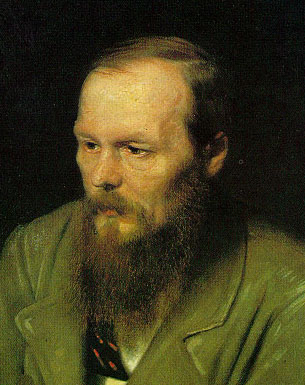Some thoughts from a failed pacifist revolutionary. And: not all sci fi is Star Trek, after all.
"I am a ridiculous man. Now they call me a madman, which would be a promotion if it were not that I remain as ridiculous in their eyes as I did before... I have always been ridiculous, and I have known it, perhaps, since the hour I was born..."
So opens the classic existential science fiction and fantasy short story "The Dream of a Ridiculous Man."
In some ways depressing, in others uplifting, "The Dream of a Ridiculous Man" reflects, to me, the absurdity of trivial truth and the sensation of revelation when the depth of that truth is recognized.
The book opens with the unnamed main character, The Ridiculous Man, pondering how he went from being suicidal to full of hope.
In his recollections, he describes his suicidal plans. While walking through the city pondering his own self-destruction, he bumps into a little urchin who is crying for her mother. In a fit of self-absorption, he shakes her off his arm and continues with his plans.
But why, he asks himself, does he abandon the girl? He had literally nothing to lose at that point; he was planning to die in a few hours.
While pondering these and other thoughts, he drifts off into a deep sleep and enters a dreamworld. Here he consummates his fantasy of self-destruction and, rather than dying, is shuttled off by some faceless entity.
He describes his trip among the stars, passing through constellations he recognizes to land on an unknown planet with a sun very much like our own.
Upon landing, he is at first fearful, but discovers a people who lead an elf-like life: kind, generous, sharing, never killing, only loving, who sing beautiful songs in a language unknown to him. Their god is earth and compassion; their worship time together in peace.
But a drop of corruption falls on the earthlike world: while before his arrival they never lied, never cheated, never stole, they suddenly become, gradually, more... human.
They discover lust and avarice, science and technology, and begin to place a larger value on knowledge than compassion.
He loves these people dearly, perhaps even more sullied than when they were pure. In a fit of madness he demands to be crucified at their hands:
"I loved the earth more now that it had been polluted than when it had been a paradise... I besought them to crucify me, I taught them how to make a cross... I yearned for suffering... but they only laughed at me...:
Grief transports him back to earth, where he is filled with a new passion - to teach The Truth, the truth he discovered in the other world:
"A dream!... In one day, one hour, everything could be arranged at once! The main thing is to love others as you love yourself... it's an old truth that's been repeated and retold a billion times..."
This is a story that needs to be re-read and re-appraised, not only by the members of Occupy, but also for anyone with a heart like this.
The will to masochism and self-sacrifice is not enough. Dostoevsky learned that the hard way: he was a utopian socialist when he was a member of the Palm-Durov Circle. He was later arrested for his association with the Socialist movement.
I often see the same elements in Occupy as I see in the Palm-Durov and Dostoevsky: impractical dreamers who quarrel among themselves and irritate power; the urge and will to submit to masochistic abuse by antagonistic authority but not the will to submit to a sympathetic authority which can re-direct that diffuse power into something meaningful and changing.
The Palm-Durov was disbanded by the Russian government in 1849. Later, utopian socialism developed into what we now know as Communism. Unlike the utopians, which were a nonviolent movement, the Communists used violence, first in the Revolution of 1905 and then later the violent overthrow of the Czar in 1917.
It's not that I don't empathize with the Occupiers in many ways. While I don't necessarily agree with them, I think I understand the mentality. I just wish that the Occupiers were a little more introspective, thoughtful, and controlled, and believed more deeply that history and authors have a great deal to teach them about themselves.
Dostoevsky pointed out that "Love others as you love yourself" is a trivial but profound truth. But to me, so is "What has been will be again, what has been done will be done again; there is nothing new under the sun."

No comments:
Post a Comment